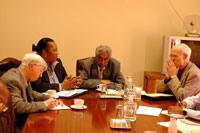





 The advertising and communication sector broad-based Black Economic Empowerment Charter and Scorecard was presented to the Minister in The Presidency, Dr Essop Pahad, at the Union Buildings in Pretoria yesterday, 26 July 2005, by the Monitoring and Steering Committee for the Transformation of the Marketing and Advertising Industry.
The advertising and communication sector broad-based Black Economic Empowerment Charter and Scorecard was presented to the Minister in The Presidency, Dr Essop Pahad, at the Union Buildings in Pretoria yesterday, 26 July 2005, by the Monitoring and Steering Committee for the Transformation of the Marketing and Advertising Industry.
The next step is to wait for the public relations industry - brought on board at the last minute as part of the communications industry value chain - to report back to members in the next 14 days. The draft Charter and Scorecard will then go to every representative industry organisation in the marketing, advertising and broader-communications value chain to be ratified at separate signing ceremonies in August, before being forwarded to the Department of Trade and Industry, which will appoint a Charter Council to audit the process over the next three to nine years to 2014.
This industry was the first to be investigated publicly for racism in October 2001, when the Portfolio Committee on Communication, an organ of the National Assembly in Parliament, convened public hearings into the pace of transformation in the advertising and marketing value chain. After finding that the pace of transformation in the value chain was unacceptably slow, the Portfolio Committee on Communication directed that Government should facilitate a consultative process with all stakeholders with the view of finding a common blueprint for the transformation of the industry.
 The industry stakeholders are: ACA, MFSA, SAMRA, ASA, Design SA, SAARF, NAB, AMF, THINK, YIPEE (Young Industry Professionals Enhancing Empowerment), CAFÉ, MAPP-SETA, MDDA, REFINERY, RIT AG, PRISA, CPA. Government stakeholders include: GCIS, DTI, Communications, National Treasury, Education, Labour, DPSA, Arts & Culture ministries.
The industry stakeholders are: ACA, MFSA, SAMRA, ASA, Design SA, SAARF, NAB, AMF, THINK, YIPEE (Young Industry Professionals Enhancing Empowerment), CAFÉ, MAPP-SETA, MDDA, REFINERY, RIT AG, PRISA, CPA. Government stakeholders include: GCIS, DTI, Communications, National Treasury, Education, Labour, DPSA, Arts & Culture ministries.
This mandate resulted in the first joint undertaking by all stakeholders to commit to a unified view and common approach. This undertaking was codified as 'The values statement of the marketing and communications industry'. It was endorsed by all stakeholders, adopted and signed on 23 April 2003.
Buoyed by 'The values statement' and further encouragement by the Portfolio Committee, the advertising and marketing sector with the help of Government Communications (GCIS), intensified its efforts to find a common platform.
A joint task team was mandated to lead the challenge of harnessing and unifying the sectors strengths into one representative charter. This culminated in the advertising and marketing indaba where the first draft scorecard was publicly presented. After further discussions and engagement with stakeholders and interest parties a final draft was developed which has been adopted as the sector's Black Economic Empowerment (BEE) charter.
This charter represents the industry's commitment to the provision of the Broad Based Black Economic Empowerment (BEE) Act number of 2004.
The main principles of the Scorecard are:
BEE ownership targets: 30% by 2008 / 45% by 2014
BEE management targets: 30% by 2008 / 50% by 2014
BEE procurement targets: 25% by 2008 / 50% by 2014
Because the development of small business is a Government priority, and the fact that this industry consists of many one or two-person consultancies, the definition of an SMME and the targets are being redefined. A figure of 35% has been mentioned.
It has been accepted by all stakeholders:
To monitor and audit the transformation process to 2008 and 2014, a Charter Council will be established as an independent body with a mandate to oversee the implementation of the charter. The Charter Council will address the issues of principles and, in particular conduct the reviews and monitor:
1. If there is a material change in circumstances or the environment in which the charter has to be implemented, it will consider whether the targets and implementation strategies are still appropriate, and if not how they should be varied.
2. There will be equality between sector association representatives and all others on the Charter Council. The Charter Council must fairly reflect the interests of all marketing and communication sub-sectors.
3. Decisions of the Charter Council will be taken on a consensual basis. If, on any issue, the Charter Council is unable to achieve consensus, there will be a dispute-breaking mechanism in the Charter Council either by some agreed mechanism with the Charter Council, or by reference to arbitration or mediation.
4. The Charter Council will establish an executive to attend to its routine work and specifically to:
The value statement adopted by the industry to ensure authenticity to the process was:
INCLUSIVITY AND DIVERSITY
The industry reflects and shapes the norms of our society. As such it must be committed to reflecting the values and aspirations of all South Africans. This requires the industry: in its industry and make-up and ownership as well as in the traditions and cultures it draws upon; to reflect the diversity of the South African population. The industry is committed to sustainable skills development which enables all our people to enjoy access to the knowledge-base needed to shape their destinies within the industry.
SOUL OF THE NATION
This industry works in the context of a unique transition - a transition described as a miracle. We shall use our strengths to promote pride in the South African Brand. The industry can contribute to the transition by promoting understanding and appreciation of our diverse cultures, traditions, histories, abilities and disabilities. It can highlight prejudice where it exists by promoting tolerance of all human beings. In doing so, the industry can become a mirror of the soul of the nation.
RESPECT AND HUMAN DIGNITY
The industry works in a society where the poor, illiterate, the disabled, women and children suffer a myriad of intolerances. While working for their amelioration and empowerment, the industry shall ensure that the dignity of all human being, and in particular of these vulnerable groups, is respected. The industry recognises the difficulty of escaping the stereotyping of any group. Where this has to be resorted to, the i
